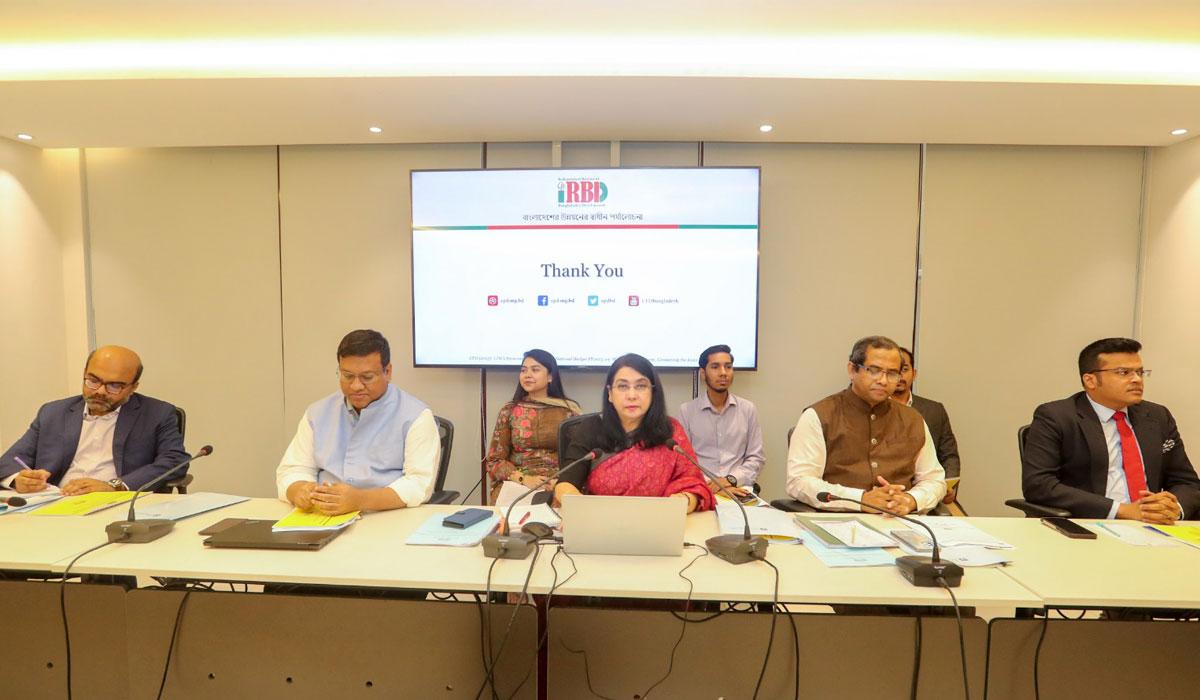
The national budget for FY2023-24 will be the last budget prepared by the incumbent government prior to the upcoming national elections. It is being prepared amidst a number of disquieting developments – both at the global and domestic fronts. The challenges facing the economy are to restore macroeconomic stability, consolidate the gains of the past, and adjust to new realities keeping the growth and stability trade-off in the perspective. The upcoming budget will need to address these attendant concerns amid election-related uncertainties. This will require renewed efforts towards raising the quality of macro-fiscal planning and management which, in turn, will require some hard choices on the part of the policymakers.
In this backdrop, the Centre for Policy Dialogue (CPD) has proposed a number of fiscal budgetary measures and initiatives at its media briefing titled “Recommendations for the National Budget FY2023-24”, held on Monday, 27 March 2023. It was organised under CPD’s flagship programme Independent Review of Bangladesh’s Development (IRBD).
CPD’s budget recommendations focused on six areas – (i) macroeconomic management (ii) fiscal framework (iii) prices of commodities (iv) subsidies (v) health and education (vi) environmental concerns.
Dr Fahmida Khatun, Executive Director, CPD made the keynote presentation at the media briefing on behalf of the IRBD research team and highlighted CPD’s recommendations.
To prepare for macroeconomic management in difficult times, CPD recommended that the Government of Bangladesh (GoB) will need to reprioritise public expenditure and opt for targeted fiscal measures and the national budget for FY2023-24 will need to be cognisant of this. Market-based interest and exchange rates should be pursued to address the existing situation. Stabilising the prices of the essential commodities would require economic and institutional and social protection measures for the low-income and fixed-income earning population groups.
In terms of fiscal framework, the design and fiscal targets of the upcoming FY2023- 24 should be set in a realistic manner, taking cognisance of the current macroeconomic trends – both domestic and external. Personal income tax (PIT) structure in FY2022-23 budget has remained mostly unchanged from the one introduced in FY2020-21. CPD argued that lowering of the highest tax rate, from 30 per cent to 25 per cent, went against the idea of tax equity. In the FY2023-24 budget, the maximum tax rate should be restored to 30 per cent from the existing 25 per cent. Given the increased pressure of the commodity price hike, particularly those of food items, the tax-free income threshold for personal income should be increased to BDT 3.50 lakh.
To ease the cost of living crisis, the Minimum Wage Board should consider increasing the minimum wages in all industries to make basic food affordable. Private sector corporations should consider a higher salary increment to support their employees. Government should carefully examine the duty and tax structures of the essential commodities, both at import and domestic levels, and make downward adjustments with a view to provide some respite to low and limited income-earning consumers.
In terms of subsidy management in the Power sector, subsidies should be rationalised by reducing the burden of capacity payment provided to the Independent Power Producers (IPPs) . A market-based price-setting mechanism should be introduced in the power and energy sector under Bangladesh Petroleum Corporation (BPC). Budget allocation should be provided on a priority basis for domestic gas exploration.
In the export sector, a detailed study on the assessment of the effectiveness of cash incentives for export needs to be undertaken. Priority should be given to non-RMG sectors for providing export cash incentives. Subsides should be allocated for non-cotton textiles. In case of cash incentives for inward remittance, market-based exchange rate should be introduced to reduce the exchange rate gaps.
Higher subsidies for fertilisers should be provided to the agriculture sector and should be managed effectively. The scope of quick transformation to solar-based irrigation system from diesel-based irrigation system should be pursued.
It is necessary to increase the budget allocation for the health sector. A number of fiscal measures should be implemented to promote improved public health and maximise the welfare of the society. The government should eliminate the tiers of cigarette taxation and replace them with a single universal system. CPD proposed a specific excise duty of BDT 6 on per gram of Jarda and Gul to be implemented in FY2023-24 and should be increased by at least BDT 1 each year. For soft drinks and energy drinks, CPD recommends that the government should put a specific excise duty of BDT 0.10 per ml or BDT 100 per litre.
While the government has exempted Bangla medium schools, and later private universities from paying VAT on tuition fees, the VAT on English medium schools continues to be 5 per cent. The existing VAT puts an additional burden on the parents of the middle-income households. Therefore, the VAT on tuition fees for English medium schools should be exempted in FY2023-24. CPD has also proposed an increase in the allocation for all education stipends to be implemented in the budget for FY2023-24.
To reduce air pollution, VAT exemption on all types of equipment in a renewable power plant, especially solar power plants, should be considered from FY2023-24. A 1 per cent surcharge on the goods produced by industries polluting the environment should be implemented.
With the goal of reducing plastic pollution, the government should consider bringing single-use plastic products under taxation in FY2023-24. The budget for FY2023-24 should allocate additional funding for the Joint Rivers Commission to establish a bilateral plastic waste reduction initiative with India.
The media briefing was followed by a Q&A session with journalists. The programme was live streamed on CPD’s social media.



